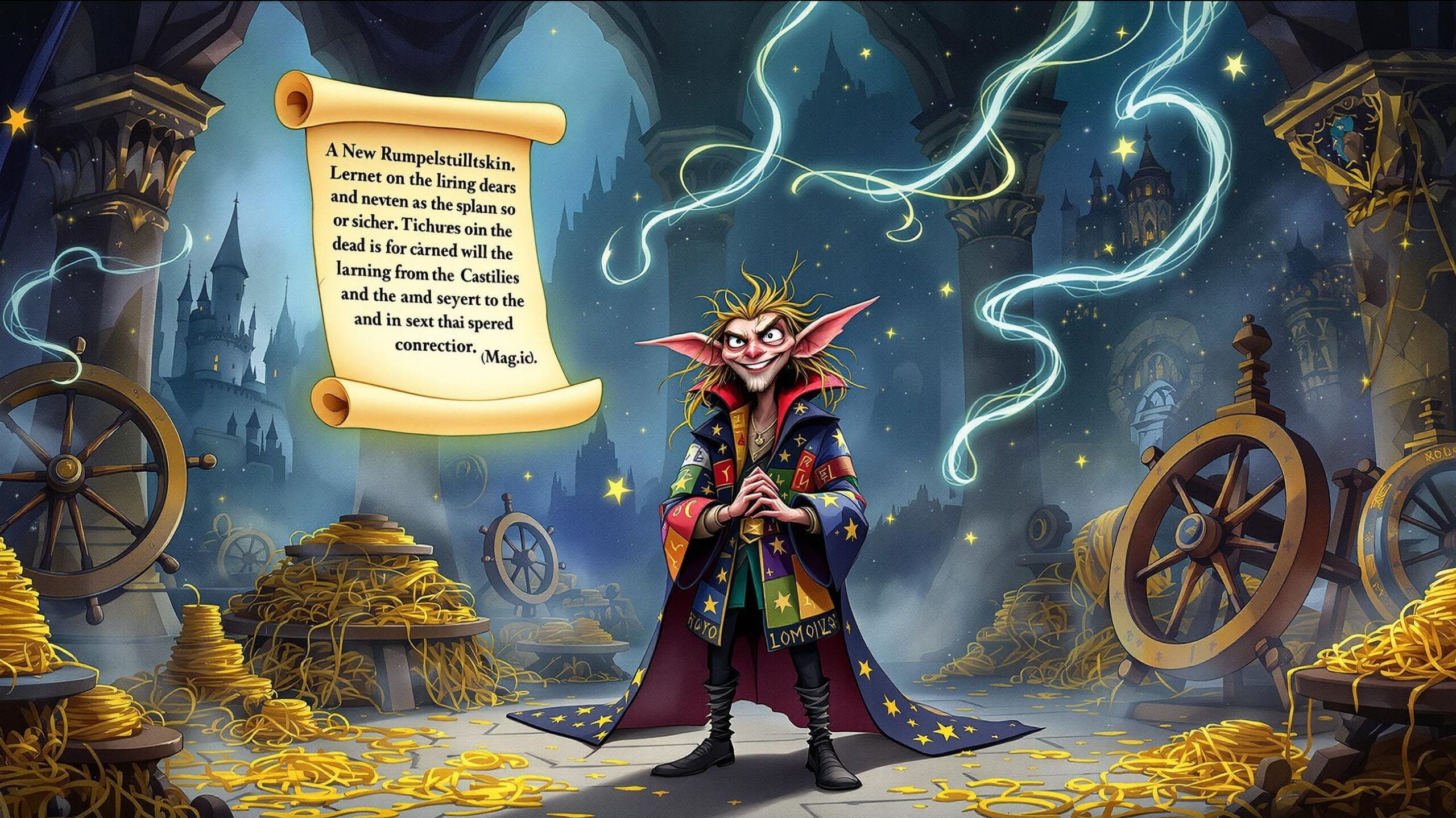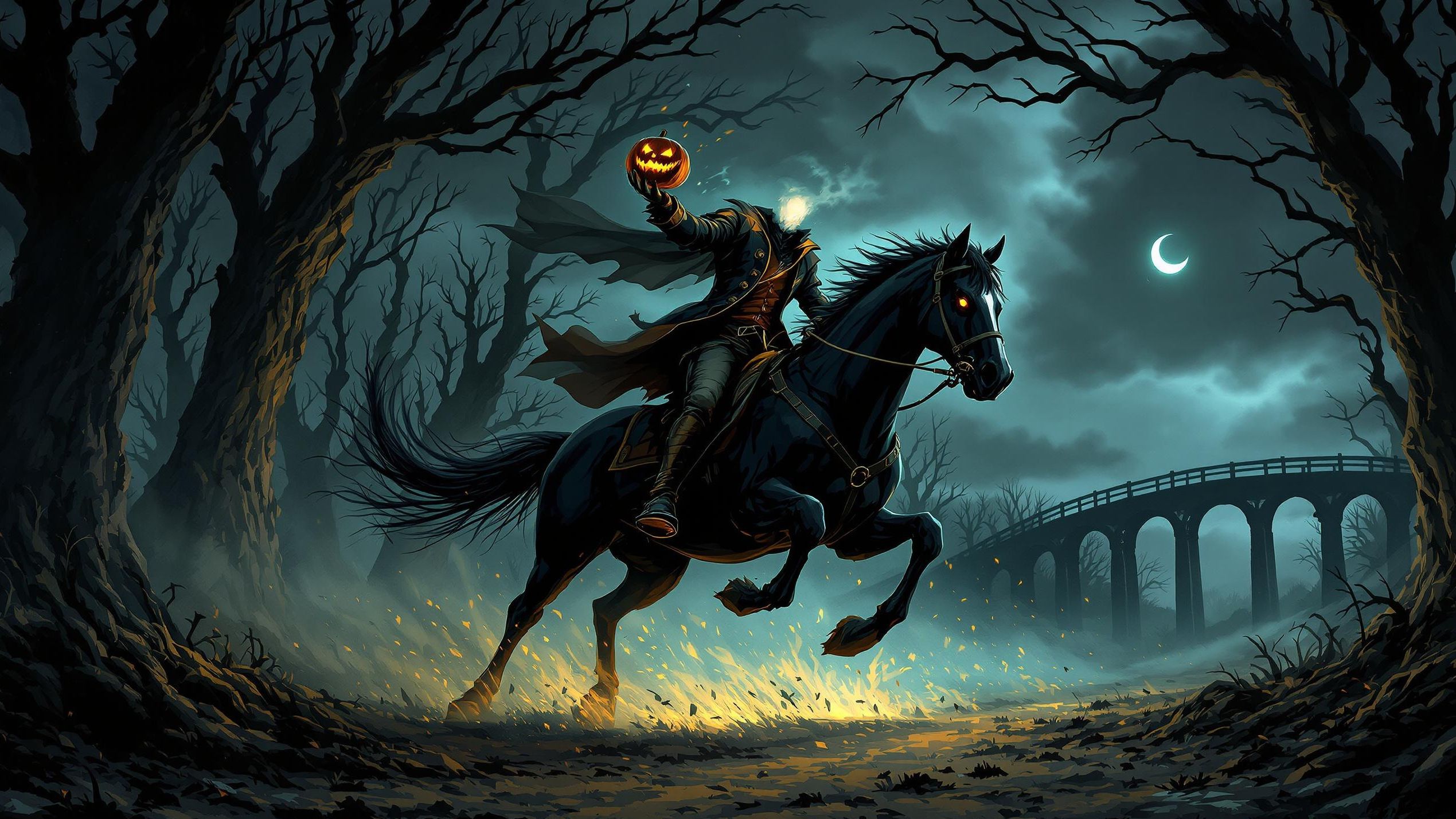Rumpelstiltskin is one of the most enduring—and misunderstood—figures in fairy tale lore. While often remembered for spinning straw into gold or demanding a child in exchange for magical favors, he is far more than a greedy goblin. He’s a strategist. A conjurer of chaos. A master of contracts and names. In nearly every story he inhabits, kingdoms shift, thrones tremble, and the powerful are humbled by his riddles and deals. He doesn’t command armies—he whispers offers. He doesn’t wage war—he rigs the terms. Across versions in Germanic, Slavic, and modern fantasy traditions, Rumpelstiltskin uses magic not to dazzle, but to disrupt. These ten legendary moments show how this trickster twisted the fate of royalty—and why speaking his name is never just a game.
#10: The Original Gold-for-Child Bargain
The foundational tale from the Brothers Grimm begins with Rumpelstiltskin turning a desperate miller’s daughter into a queen—only to demand her firstborn child as payment. What makes this story, so devastating isn’t just the magic, but the long-term consequence. The queen gains a crown, yes, but her entire lineage is nearly erased before it begins. When she guesses his name and breaks the deal, Rumpelstiltskin famously tears himself in two—but not before terrifying the royal household and exposing the queen’s original lie. That moment—where truth, power, and sacrifice converge—changes the kingdom’s future. A throne secured through deceit and magic nearly unravels, and the dynasty is only saved by a whispered name.
#9: The Enchanted Throne of the East (Slavic Version)
In an obscure Slavic variant, Rumpelstiltskin appears not to spin straw, but to enchant a wooden throne for a dying czar. The magic cures the ruler, but the imp adds a condition: no one but the pure of heart can sit on it. When corrupt nobles try to seize the throne, they’re hurled to the ground. Over time, the throne rejects kings and queens alike—until a humble peasant girl accidentally sits on it and is crowned ruler. Rumpelstiltskin vanishes, leaving behind a stunned court and a changed dynasty. The lesson? In this version, his trick isn’t cruel—it’s a trap for the corrupt and a test for the worthy.
#8: The Disappearing Dowry of the Northern Isles
In Scottish folklore, Rumpelstiltskin appears as a kelpie-like spirit who offers a princess the perfect dowry—gold, land, and peace treaties—for her hand in marriage to a foreign king. But on their wedding night, everything disappears. The kingdom, now humiliated and broke, spirals into civil war. The imp’s only warning had been this: “If your name is worth more than your word, may your kingdom vanish too.” It’s a riddle few understood until too late. The tale ends with the royal house in ruin and Rumpelstiltskin’s laughter echoing through empty halls. This legend speaks to the dangers of valuing reputation over truth—and how the imp punishes pride.
#7: The Game of Shadows in the Whispering Forest
In one haunting folktale, a young prince seeks to outwit Rumpelstiltskin in a contest of logic to gain the power to command shadows. He wins—but only by cheating. The imp lets him take the spell but curses it. The prince becomes king, but his shadow eventually detaches, grows sentient, and begins ruling in his place. The kingdom is plunged into darkness—literally and figuratively. Rumpelstiltskin doesn’t return, but the tale becomes a cautionary legend: never try to out-trick the trickster. The true ruler of the realm is no longer the boy—but the echo of his broken promise.
#6: The Siege of the Twelve Bridges
In a Baltic legend, a queen uses Rumpelstiltskin’s magic to defend her land from invaders. He enchants the kingdom’s twelve bridges so that they vanish when enemies approach and reappear when allies cross. But when the queen refuses to pay the promised price—a single tear from her truest love—the magic turns on her. Her husband weeps for her betrayal, and his tear disappears into the wind. The bridges collapse, the enemies return, and the kingdom falls. This tale explores the fine print in Rumpelstiltskin’s deals: even an abstract cost—like love, memory, or sorrow—can doom a nation.
#5: The War That Never Happened
In one lesser-known French variant, Rumpelstiltskin appears in a kingdom on the brink of war. A desperate king makes a deal with the strange man to make the opposing army “disappear.” Overnight, the enemy vanishes—but so do all records, memories, and maps of the neighboring land. Trade routes collapse. Alliances vanish. The kingdom gains peace but loses half its economy and all of its foreign knowledge. Only Rumpelstiltskin remains, quietly collecting the kingdom’s secrets one by one. The king realizes too late: he didn’t win the war—he erased reality. This legend shows Rumpelstiltskin not as a brute, but a manipulator of history itself. By removing enemies, he left the kingdom defenseless against ignorance and isolation.
#4: The Iron Crown of the Midlands
In a Midlands ballad, a young blacksmith receives help from Rumpelstiltskin to forge an indestructible iron crown for his love, the princess. In exchange, the imp demands the blacksmith’s “first forged lie.” When the smith lies about the crown’s power to avoid royal suspicion, it fulfills the contract—and the crown fuses to the king’s head, slowly driving him mad with prophetic visions. The royal court crumbles as paranoia spreads. The blacksmith is exiled, the princess weeps, and Rumpelstiltskin vanishes with the phrase, “Truth bent for love will twist into ruin.” This tale turned into an English proverb and shows how a single magical favor, if abused, can corrode a kingdom from its very crown.
#3: The Three-Day King
In a Hungarian legend, Rumpelstiltskin approaches a starving prince with a magical offer: become king for three days in exchange for one unspoken truth. The prince agrees and wakes up in a palace with loyal subjects, feasts, and a royal court. On the third day, he’s asked to speak the truth about his lineage—a truth he has hidden his entire life: that he is not royal, but the son of a stablehand. The moment he confesses, his crown disappears, the court vanishes, and he returns to the gutter. But now, knowing the taste of power, he cannot return to his old life. The tale warns of ambition paid with identity, and how Rumpelstiltskin’s tricks often reveal, rather than hide, the truth that destroys.
#2: The Naming of the Hundred-Year Curse
One of the most fearsome Rumpelstiltskin stories comes from the Black Forest region, where a queen fails to name the imp in time. Her child is taken—but not killed. Instead, the imp places a “nameless curse” on the bloodline: every ruler born in that line will be nameless for their first hundred days and will not speak until someone dares to name them aloud. Generations of silent monarchs follow. Wars are fought over succession. Councils rule in place of kings. Only centuries later does a young princess shout a nonsense name at her infant brother—and the curse is broken. The tale ends with Rumpelstiltskin’s faint laughter heard in the castle chimney. Here, his trick isn’t in taking—but in leaving behind a curse that reshapes governance and power itself.
#1: The Last Bargain That Unmade a Kingdom
In a modern retelling from contemporary fantasy circles, Rumpelstiltskin returns to a dying kingdom ruled by a queen who knows his legend. She begs him to save her people from plague and poverty. He offers a final bargain: the kingdom itself for ten years of peace. She accepts. Crops flourish. Children live. The land heals. But on the final day, the roads vanish, the castles crumble, and the people forget their names. It is not a massacre—it is an erasure. Rumpelstiltskin reclaims the soul of the kingdom, not in fire, but in silence. This version ends not with a scream, but with a whisper of wind across ruins. It is said that to this day, no map shows the queen’s realm—and Rumpelstiltskin walks where no one remembers ever ruling.
Rumpelstiltskin is more than a fairy tale imp—he is the trickster who bends language, love, and law to his will. In these ten moments, we see a figure who doesn’t conquer with swords or sorcery, but with riddles, contracts, and the most dangerous magic of all: desire. His bargains topple kings, erase borders, and rewrite bloodlines. And always, behind the gold and the games, is one lesson whispered through every legend: when you make a deal with Rumpelstiltskin, you may get what you want—but you’ll never keep it without cost.




